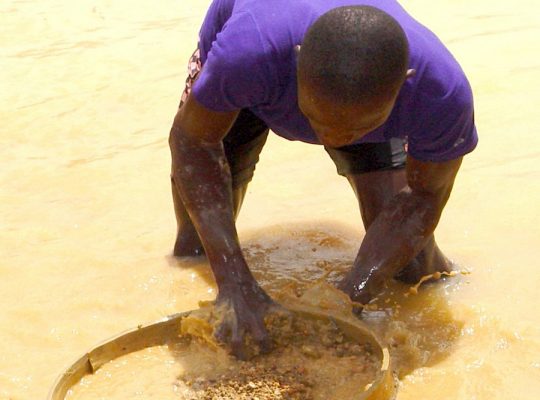Anglo American’s De Beers is stepping up efforts to remove so-called “conflict” diamonds from the market by expanding a pilot program in Sierra Leone, which is set to help trace the route of precious stones dug up there by small miners.
The world’s largest rough diamond producer by value said Wednesday the decision to scale up its GemFair trial was made to give more artisanal and small-scale miners (ASM) the opportunity to benefit from the program.
After training ASM in 16 mine sites across Sierra Leone on how to use provided tablets to digitally track their diamonds throughout the supply chain, De Beers has extended the pilot to work with a further 38 sites and widen its impact, it said in the statement.
De Beers’ GemFair program gives small miners an app and dedicated tablet as well as a diamond “toolkit” that enables the digital tracking of diamonds throughout the supply chain.
The company has also partnered with the Diamond Development Initiative (DDI), an NGO in helping to formalize the diamond ASM sector in Africa.
De Beers’ plan to encourage mine owners to join GemFair is based on a membership model whereby mine sites that meet a strict set of core requirements, aligned with the OECD’s standards can join the program sell diamonds to GemFair.
Miners then work with DDI towards achieving full Maendeleo Diamond Standards (MDS) certification, within a one-year timeframe, De Beers said.
“While registered miners have no obligation to accept offers to purchase diamonds through the GemFair buying office, they are provided with free training in diamond valuation, so they can make an informed assessment about the value of their diamonds and negotiate the best possible deal,” it added.
Since the launch in April 2018, GemFair has seen significant progress across its operations, opening offices in both Koidu and Freetown, and developing a set of publicly available ASM standards to ensure a best practice approach for responsible sourcing.
The program has developed a digital solution to ensure the traceability of all diamonds mined by members. The toolkit contains an application and dedicated tablet that creates a digital record of each diamond found using GPS locations and QR-codes.
Tainted reputation
Artisanal mining accounts for only 20% of global diamond production, but carries a tainted reputation that’s damaged consumer confidence for almost 20 years.
Between 1991 and 2002, the district of Kono, in Sierra Leone, was at the centre of the “blood diamond” trade that funded the country’s brutal civil war as rebel groups exchanged gems for weapons.
Despite the establishment of the Kimberley Process in 2003, aimed at removing from the supply chain the now called “conflict diamonds” (those mined in an area of armed conflict and traded illicitly to finance the fighting), experts say trafficking of precious rocks is still ongoing.
According to Canada-based Centre for Research on Globalization (CRG) about one-fifth of diamonds on the global market in value terms are still a significant source of funding for regimes accused of committing crimes and human rights violations.
De Beers sells its diamonds mostly to authorized buyers at a series of so-called “sights” in Botswana, Namibia and South Africa. Then, they are normally sent to be polished or cut before ending up with retailers._Mining.com




